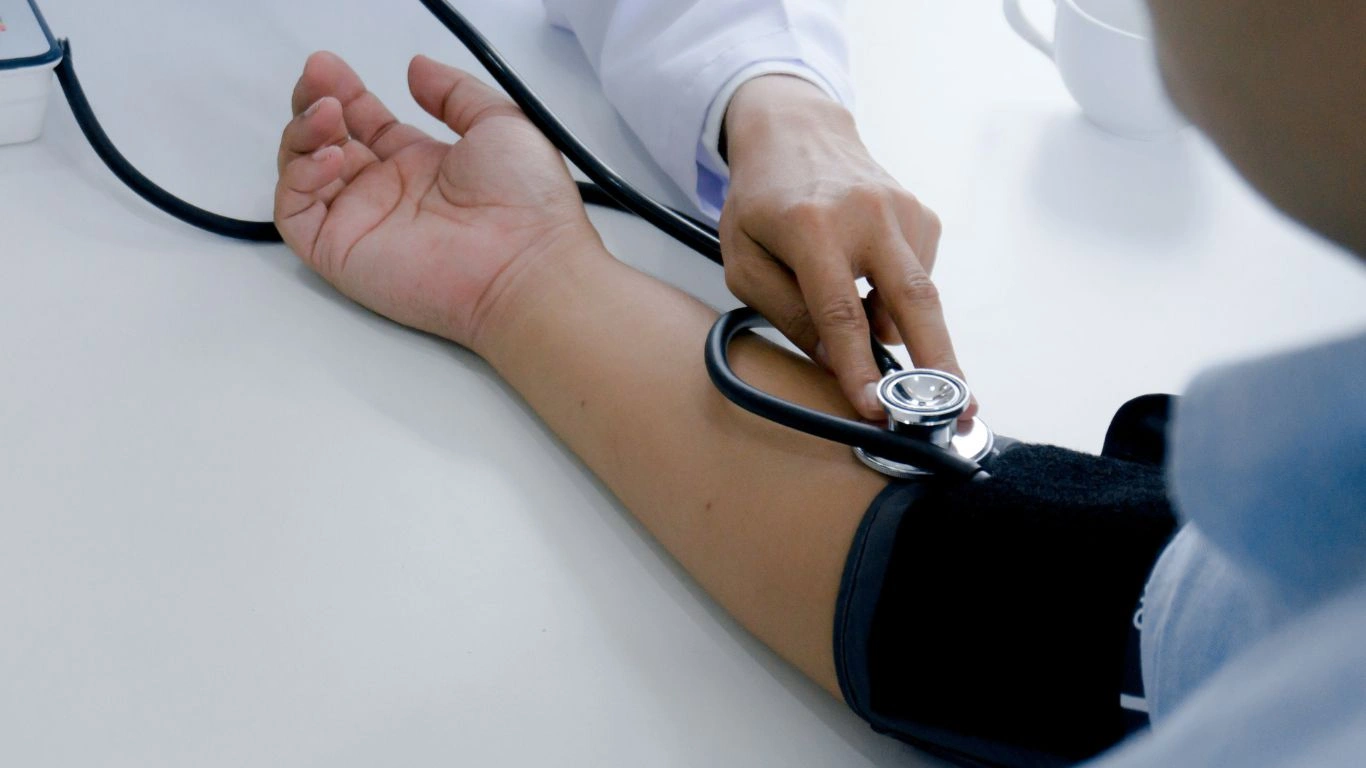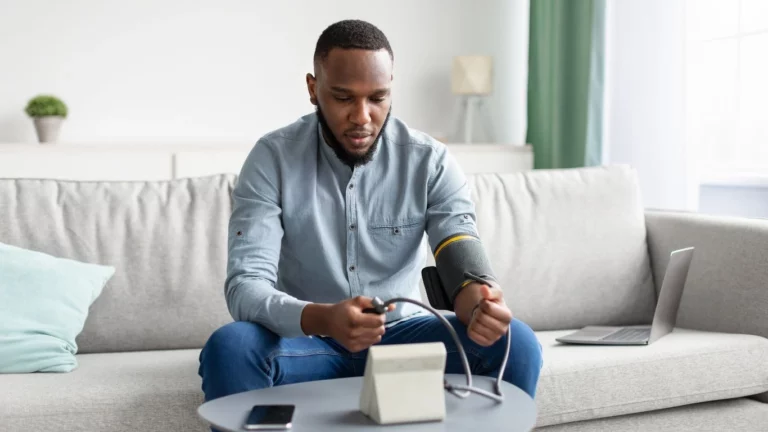How EMF Exposure Impacts Hypertension: What You Need to Know
As someone who has worked with patients suffering from high blood pressure for years, I know firsthand how serious hypertension can be. The constant worry about its impact on your health, the medications you might need, and the lifestyle changes that are recommended can all seem overwhelming. However, there’s one aspect of hypertension that many people might not be aware of — the impact of electromagnetic field (EMF) exposure on hypertension. You might be surprised to learn that this invisible, everyday environmental factor could be playing a more significant role in your blood pressure than you realize.
What is EMF, and Why Should We Be Concerned?
First, let’s break down what EMF is and why it’s something we need to consider when talking about hypertension. EMF stands for electromagnetic fields, which are invisible areas of energy that are all around us. They come from both natural and man-made sources, such as the earth’s magnetic field, power lines, mobile phones, Wi-Fi routers, microwaves, and even some household appliances. We live in a world filled with EMF, but its exact impact on our health has been a topic of debate for years.

Now, you might be wondering, “Why should I care about EMF exposure if I can’t see or feel it?” Well, research has shown that long-term exposure to EMF could be linked to various health issues, including an increased risk of developing hypertension. In my practice, I’ve seen patients who were already struggling with high blood pressure but didn’t realize that the sources of EMF in their homes or workplaces could be exacerbating their condition.
How Does EMF Exposure Affect Blood Pressure?
The relationship between EMF exposure and hypertension is still being studied, but we do know that EMF can influence our body’s biological processes. One of the ways EMF might affect blood pressure is by altering the autonomic nervous system, which controls the body’s involuntary functions, including heart rate and blood pressure. EMF has the potential to disrupt this system, causing an imbalance that could lead to higher blood pressure over time.
What’s particularly concerning is that EMF exposure might not always cause immediate symptoms, making it hard to link the two directly. However, the subtle and chronic nature of this exposure could be building up over time, leading to long-term health risks. Imagine being constantly exposed to small doses of EMF throughout the day, whether it’s from your smartphone, your laptop, or your Wi-Fi signal. Over time, this constant bombardment could lead to a gradual increase in your blood pressure.
Who is Most at Risk from EMF and Hypertension?
Everyone is exposed to EMF to some degree, but some people might be more vulnerable to its effects on hypertension than others. If you’re already dealing with high blood pressure, you might want to pay extra attention to your EMF exposure. Studies suggest that individuals who are more sensitive to EMF may experience a stronger response when exposed to these fields, which could further elevate their blood pressure.
- Age: Older adults tend to have a higher risk of developing hypertension, and they might also be more sensitive to environmental factors like EMF.
- Pre-existing Health Conditions: If you already suffer from heart disease or have a family history of hypertension, your body might react differently to EMF exposure.
- Electromagnetic Sensitivity: Some individuals report heightened sensitivity to EMF exposure, a condition sometimes referred to as “electromagnetic hypersensitivity” (EHS). These people may experience symptoms like headaches, dizziness, or fatigue, which could be exacerbating their hypertension.

The Link Between Stress, EMF, and Hypertension
If you’re wondering how stress fits into this equation, it’s important to note that stress is one of the key contributors to high blood pressure. We all know how stress can make our hearts race and our blood pressure spike. But did you know that EMF exposure can actually trigger stress responses in the body, even without us consciously feeling stressed?
Research has shown that EMF can stimulate the release of stress hormones, such as cortisol, which can cause blood vessels to constrict, leading to an increase in blood pressure. Over time, prolonged exposure to EMF could contribute to chronic stress, which, in turn, keeps blood pressure elevated. When I talk to my patients about managing stress, I often remind them that it’s not just emotional or mental stress that can affect blood pressure. Environmental factors like EMF can also play a significant role.
How to Reduce EMF Exposure in Your Daily Life
Now that we know EMF exposure could potentially affect blood pressure, you might be wondering how you can reduce your exposure to these electromagnetic fields. Don’t worry; there are practical steps you can take to minimize the impact of EMF on your health. As someone who’s seen how lifestyle changes can make a big difference in managing hypertension, I recommend incorporating some of the following strategies into your daily routine:
- Limit Your Screen Time: Smartphones, laptops, and other devices emit EMF, so try to reduce the time you spend using them. When possible, opt for a regular phone call instead of texting, and give yourself tech-free hours to help your body recharge.
- Use Wired Devices: Switch to wired internet connections rather than Wi-Fi, and use wired headphones or earphones when talking on the phone. This can help reduce your exposure to EMF while still allowing you to stay connected.
- Keep Distance from EMF Sources: The farther away you are from EMF-emitting devices, the lower your exposure will be. For example, avoid keeping your phone in your pocket or on your bed at night. Keep it at least a few feet away from you while you sleep.
- Turn Off Devices at Night: Before you go to bed, make sure to turn off Wi-Fi routers, mobile phones, and other electronic devices. This gives your body a break from EMF exposure while you sleep.

Taking small steps to reduce your exposure to EMF can make a world of difference in how your body responds, especially if you’re already managing high blood pressure. While it’s not always possible to eliminate EMF exposure entirely, these adjustments can help lower the impact and potentially make a significant difference in your blood pressure levels.
Understanding the Science Behind EMF and Hypertension
It’s important to understand that the connection between EMF exposure and hypertension isn’t just based on speculation or anecdotal evidence. There are scientific studies that have explored how electromagnetic fields affect human health, particularly in terms of blood pressure. While the research is still ongoing, we have learned a lot about how EMF may influence our body’s systems.

One key factor in understanding the science behind EMF and hypertension is looking at how the body responds to stress. As I mentioned earlier, EMF exposure can trigger the body’s stress response. This happens through a process called the “sympathetic nervous system activation,” which is essentially your body’s “fight or flight” mechanism. When EMF disrupts the normal functioning of the autonomic nervous system, it can lead to a chronic state of low-grade stress, even if you’re not consciously aware of it. This ongoing stress can, over time, elevate your blood pressure.
The Role of Free Radicals and Oxidative Stress
Another factor that comes into play is oxidative stress. Free radicals, which are unstable molecules that can damage cells, are produced when the body is under stress. EMF exposure has been shown to increase the production of free radicals in the body. This can lead to oxidative stress, which has been linked to a variety of health conditions, including hypertension.
Think of it this way: Free radicals are like little “troublemakers” in your body, causing damage to cells and tissues. When there’s an overload of these free radicals, it can disrupt the normal functioning of your cardiovascular system, leading to inflammation and an increase in blood pressure. This is one reason why prolonged EMF exposure could potentially contribute to long-term hypertension. In fact, studies have shown that oxidative stress plays a significant role in the development of high blood pressure and other cardiovascular diseases.
How EMF Might Contribute to Chronic Hypertension
As we continue to look deeper into how EMF exposure contributes to hypertension, it’s essential to understand the long-term impact. Short bursts of EMF exposure may not be a huge concern, but the problem arises with chronic exposure. This is something I’ve seen with many patients over the years — they often don’t realize how much time they spend around EMF-emitting devices until we take a closer look at their habits and daily routines.

For instance, let’s say you start your day with your smartphone, checking emails and messages right after waking up. Then you spend hours working on a computer, followed by more screen time in the evening for entertainment. Over time, this cumulative exposure could begin to affect your blood pressure, especially if you’re already at risk due to other factors like age, family history, or pre-existing health conditions.
What’s fascinating is that research has indicated that even relatively low levels of EMF exposure can cause a buildup of stress over time. I’ve had patients who noticed a gradual increase in their blood pressure after years of exposure to EMF sources in their homes or workplaces. For some, this came with other symptoms like fatigue, headaches, or difficulty sleeping. While these symptoms might seem unrelated to hypertension at first glance, they could actually be warning signs of EMF-related stress on the body.
Could EMF Exposure Affect Your Heart Health Beyond Blood Pressure?
While we’ve mainly been talking about the effects of EMF on blood pressure, it’s crucial to acknowledge that this type of exposure could affect your heart health in other ways. High blood pressure is just one risk factor for cardiovascular disease, but prolonged EMF exposure could potentially contribute to other conditions, such as arrhythmias (irregular heartbeats) and even an increased risk of heart attacks or strokes.
One of the most concerning aspects of chronic EMF exposure is its potential to damage the cells that line your blood vessels, known as endothelial cells. These cells play a crucial role in regulating blood flow and maintaining healthy blood pressure. If EMF exposure causes oxidative damage to these cells, it could lead to the development of atherosclerosis (plaque buildup in the arteries), which is a major contributor to heart disease.
Practical Tips for Managing EMF Exposure and Hypertension
If you’ve been following along, you might be wondering what practical steps you can take to reduce your exposure to EMF while managing your blood pressure. As someone who has helped many patients with hypertension, I’ve found that the best approach is to make small, manageable changes that fit into your daily routine. These simple adjustments can help you stay healthier and keep your blood pressure in check without feeling overwhelmed by the idea of completely eliminating EMF sources from your life.
- Create EMF-Free Zones: Designate specific areas in your home or office as “EMF-free zones.” This could be your bedroom, where you can make sure devices like phones, Wi-Fi routers, or microwaves are turned off at night.
- Use EMF-Blocking Products: There are several EMF-blocking products on the market, such as phone cases, EMF-blocking shields, and clothing made from special materials. These can help reduce your exposure when you’re on the go.
- Spend Time Outdoors: Nature is one of the best ways to counteract the effects of EMF exposure. Spend time outside, away from electronic devices, and enjoy fresh air, which can help reduce stress and lower your blood pressure.
- Mindful Tech Use: Practice mindful technology use by taking frequent breaks from screens. For example, use the “20-20-20” rule: every 20 minutes, look at something 20 feet away for 20 seconds to give your eyes and body a break.

By making these small changes in your daily routine, you can help reduce the strain EMF may place on your body and blood pressure. It’s about being proactive and aware of your environment, even when it feels like EMF exposure is something you can’t see or fully control.
Ongoing Research: What We’re Learning About EMF and Hypertension
The relationship between EMF exposure and hypertension is still being explored, and the ongoing research provides valuable insights into how these invisible forces impact our health. Over the years, scientists have conducted numerous studies to better understand the connection between EMF exposure and the development of high blood pressure. Some studies have shown a clear link, while others have called for more extensive research to confirm these findings.

As someone who’s closely followed this field, it’s encouraging to see more attention being paid to the potential health risks of EMF. Researchers are examining how long-term exposure to various sources of EMF — such as mobile phones, Wi-Fi routers, and power lines — might contribute to conditions like hypertension. These studies are crucial in understanding the full scope of the risks, especially when it comes to long-term, low-level exposure.
For instance, some studies have highlighted that EMF exposure might alter the way the body regulates its circadian rhythm, which can affect sleep patterns and overall stress levels. Since sleep is vital for managing blood pressure, disrupted sleep could potentially make hypertension worse. Additionally, some research points to how EMF exposure could lead to an increase in the production of free radicals, further contributing to oxidative stress and inflammation — both of which are known contributors to high blood pressure.
Emerging Evidence: The Role of 5G in Hypertension
With the rapid rollout of 5G technology, there has been growing concern about its potential effects on health, including its link to hypertension. While 5G promises faster internet speeds and more reliable connectivity, its higher frequency bands might pose new health challenges. This is an area of active investigation. Researchers are looking at whether 5G radiation could have a more significant impact on the cardiovascular system compared to previous generations of wireless technology.
Some studies suggest that the higher frequency electromagnetic radiation used by 5G networks may be absorbed by the body differently, potentially leading to increased oxidative stress and other health concerns. Although the long-term effects of 5G on hypertension are still unknown, it’s crucial to stay informed and monitor future research on this topic. If you live in an area where 5G is already available, it might be worth considering how much time you’re spending near 5G-enabled devices and towers.
How Lifestyle and Environmental Factors Impact Hypertension Alongside EMF Exposure
While we’ve been focusing on EMF exposure, it’s important to remember that hypertension doesn’t have a single cause. Many factors can contribute to high blood pressure, from lifestyle choices to genetic predispositions. As a hypertension expert, I often work with patients to address a range of environmental and lifestyle factors that can influence their blood pressure. These factors can either aggravate or help manage hypertension alongside addressing EMF exposure.

For example, stress management plays a huge role in controlling blood pressure. We’ve already discussed how EMF can act as a hidden stressor, but chronic emotional or mental stress can have a significant impact as well. Engaging in activities like yoga, meditation, or deep breathing exercises can help lower your stress levels, which may, in turn, help keep your blood pressure in check.
Diet is another crucial factor when it comes to hypertension. Foods rich in potassium, magnesium, and fiber can help maintain healthy blood pressure levels. Foods like leafy greens, berries, and whole grains are excellent choices. Additionally, reducing your sodium intake is a well-known strategy for lowering blood pressure. While managing your EMF exposure is important, you should also consider how your diet and other lifestyle factors can impact your blood pressure.
Exercise is another key element. Regular physical activity not only helps reduce stress but also strengthens the cardiovascular system. I often tell my patients that a moderate exercise routine, like walking, cycling, or swimming, can be just as important as any medication when it comes to managing hypertension. Plus, exercise can help your body better cope with external stressors like EMF exposure.
The Impact of Sleep and Relaxation on Hypertension
Quality sleep is crucial for maintaining healthy blood pressure. However, if you’re exposed to EMF right before bed, it might disrupt your sleep patterns, leading to poorer sleep quality and higher blood pressure. One way to mitigate this is by setting a technology curfew. Turn off your devices at least an hour before bed to give your body a chance to relax and prepare for restful sleep. Your body needs time to unwind, and reducing EMF exposure in the evening can help you get better, deeper sleep.
In addition to sleep, relaxation practices such as mindfulness and progressive muscle relaxation can also be beneficial. By taking time to unwind and relax your mind, you can counteract the negative effects of stress, including the stress induced by EMF exposure. These small, intentional habits can make a big difference in how your body responds to the many environmental factors influencing your health.
References
If you’re interested in diving deeper into the scientific research surrounding EMF and hypertension, here are a few references to explore further:
- Google Scholar – Search for studies related to EMF and hypertension.
- National Institutes of Health – A database for peer-reviewed research articles on the topic.
- World Health Organization – Information on EMF health guidelines and safety.
Disclaimer
The information provided in this article is based on current research and my professional experience as a hypertension expert. However, individual health conditions vary, and it’s important to consult with your healthcare provider before making any changes to your lifestyle or treatment plan. The links provided are for informational purposes only and do not constitute medical advice. Always seek the guidance of a qualified healthcare professional when managing your blood pressure or considering changes to your health regimen.

Dr. Gwenna Aazee is a board-certified Internal Medicine Physician with a special focus on hypertension management, chronic disease prevention, and patient education. With years of experience in both clinical practice and medical writing, she’s passionate about turning evidence-based medicine into accessible, actionable advice. Through her work at Healthusias.com, Dr. Aazee empowers readers to take charge of their health with confidence and clarity. Off the clock, she enjoys deep dives into nutrition research, long walks with her rescue pup, and simplifying medical jargon one article at a time.







